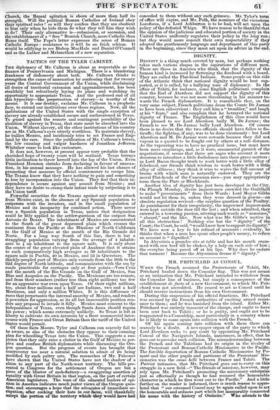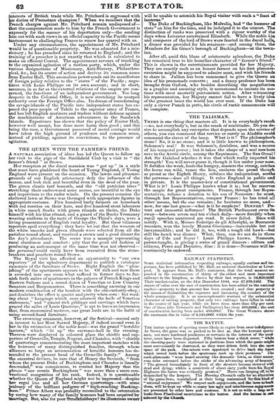MR. PRITCHARD AS CONSUL.
WHEN the French assumed the Protectorate of Tahiti, Mr. Pritchard hauled down the Consular flag. This was not meant as an intimation that Mr. Pritchard intended to withdraw from the Consular line of business, but simply a consequence of the establishment de facto of a new Government, to which Mr. Prit- chard was not accredited. He ceased to act as Consul until he should receive instructions from his own Government.
During this suspension of his official functions, Mr. Pritchard was accused by the French authorities of exciting armed resist- ance to them ; and he was banished from the island. Either Mr. Pritchard was entirely innocent of the charge, and ought to have been sent back to Tahiti ; or he is guilty, and ought not to be reappointed to a Consulship, most particularly in a country where he is likely to come again into collision with the French.
Of his again coming into collision with them there can scarcely be a doubt. A newspaper organ of the party to which Lord Aberdeen seeks to pay court by appointing-Mr. Pritchard Consul of the Navigators Islands, announces, in effect, that he goes out to provoke such collision. The misunderstanding between the French and the Tahitians had its origin in the rivalry of the Protestant and Roman Catholic Missionaries in the Pacific. The forcible deportation of Roman Catholic Missionaries by Po- mare and the other pupils and partisans of the Protestant Mis- sionaries was the cams belli between France and Tahiti. The Patriot intimates, that Mr. Pritchard goes out to carry on this struggle in a new field—" The friends of missions, however, may rely upon Mr. Pritchard's promoting the missionary enterprise just as effectually as though he had resumed the honourable character in which he first went out to the Pacific." And a little further on the reader is informed, there is much reason to appre- hend that "our esteemed Consul may be again called upon to act the honourable and arduous part which has inseparably connected his name with the history of Otaheite." Who attends to the
interests of British trade while Mr. Pritchard is engrossed with his duties of Protestant champion ? When we recollect that the French charges against Mr. Pritchard remain undisposed of— that the compensation made to him by the French Government is expressly for the manner of his deportation only—the sending out with such views in an official capacity to the Pacific seems tantamount to challenging France to renew her quarrel with us.
Under any Circumstances, the appointment of Mr. Pritchard Would be of questionable propriety. He was educated for a mis- sionary; he has preached since he returned to England; and the training of a preacher is not exactly that which is calculated to make an efficient Consul. The appointment savours of truckling to the oraanip eed agitation of a restless party, which, under the various designations of Missionary, Anti-Slavery, Philanthro- pical, &c., has its centre of action and derives its common name from Exeter Hall. This anomalous power sends out its manifestoes of foreign policy relative to the " states " of the Pacific ; nego- tiates with Louis Philippe on its own account; and in short, assumes' in so far as the external relations of the empire are con- cerned, the functions of an independent government. Too long despotic in the Colonial Office, it is now stretching its usurped authority over the Foreign Office also. Its dream of transforming the savage islands of the Pacific into independent states has ex- posed the poor people of Tahiti to the superior arms of France, and has left English mariners and traders without defence against the machinations of American adventurers in the Sandwich Islands. Experience has shown that the policy of Exeter Hall, however well meant, has done more harm than good ; and this being the case a Government possessed of moral courage would have taken the high ground of prudence and common sense, instead of yielding, against its convictions, to the pressure of agitation.



























 Previous page
Previous page